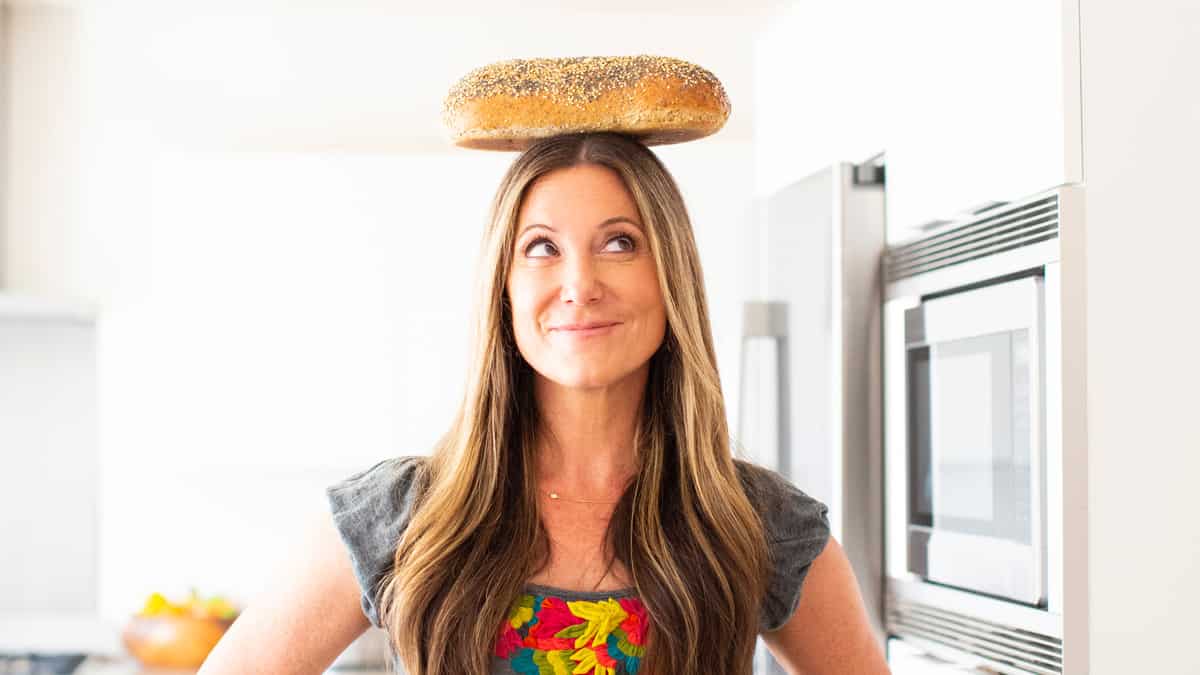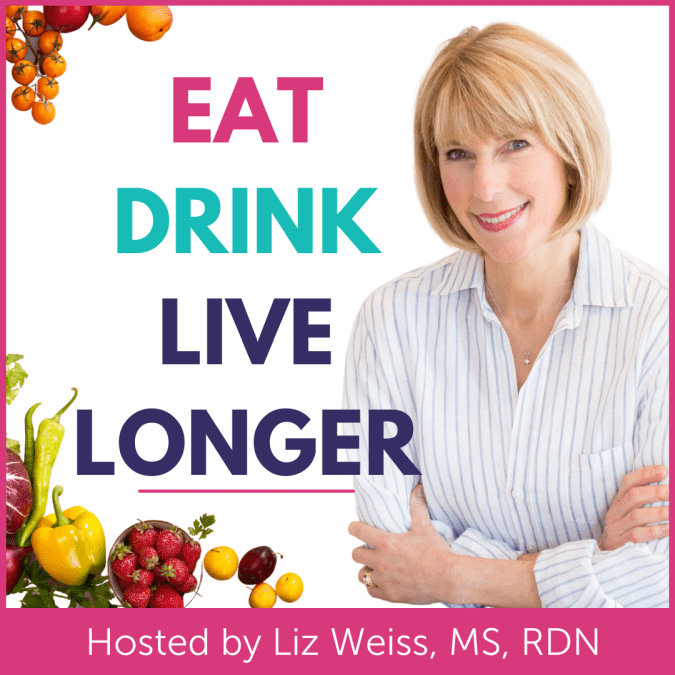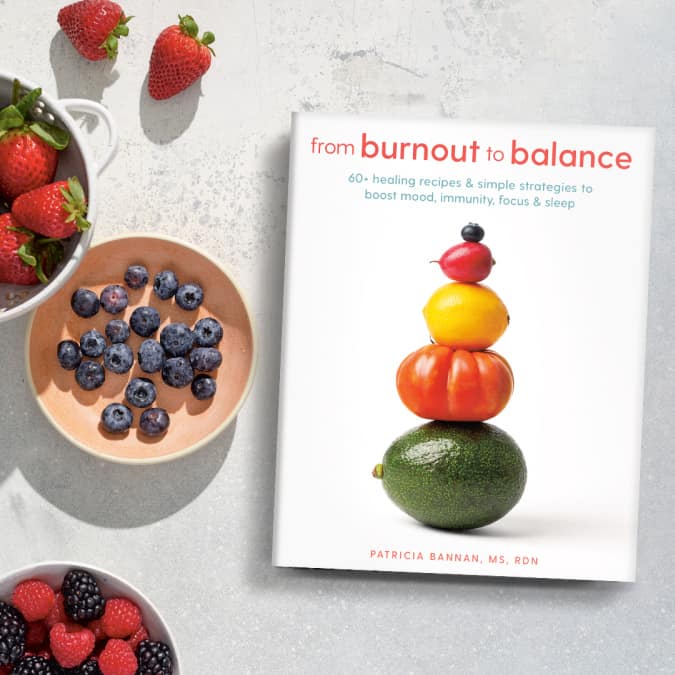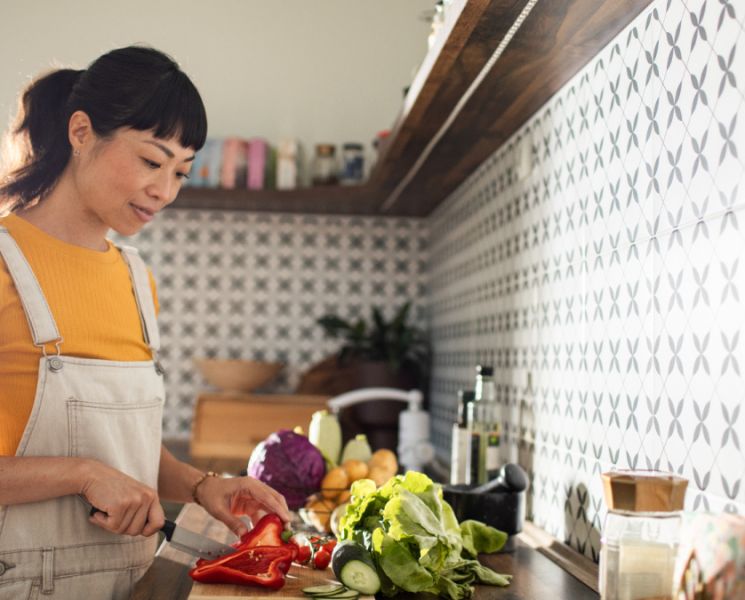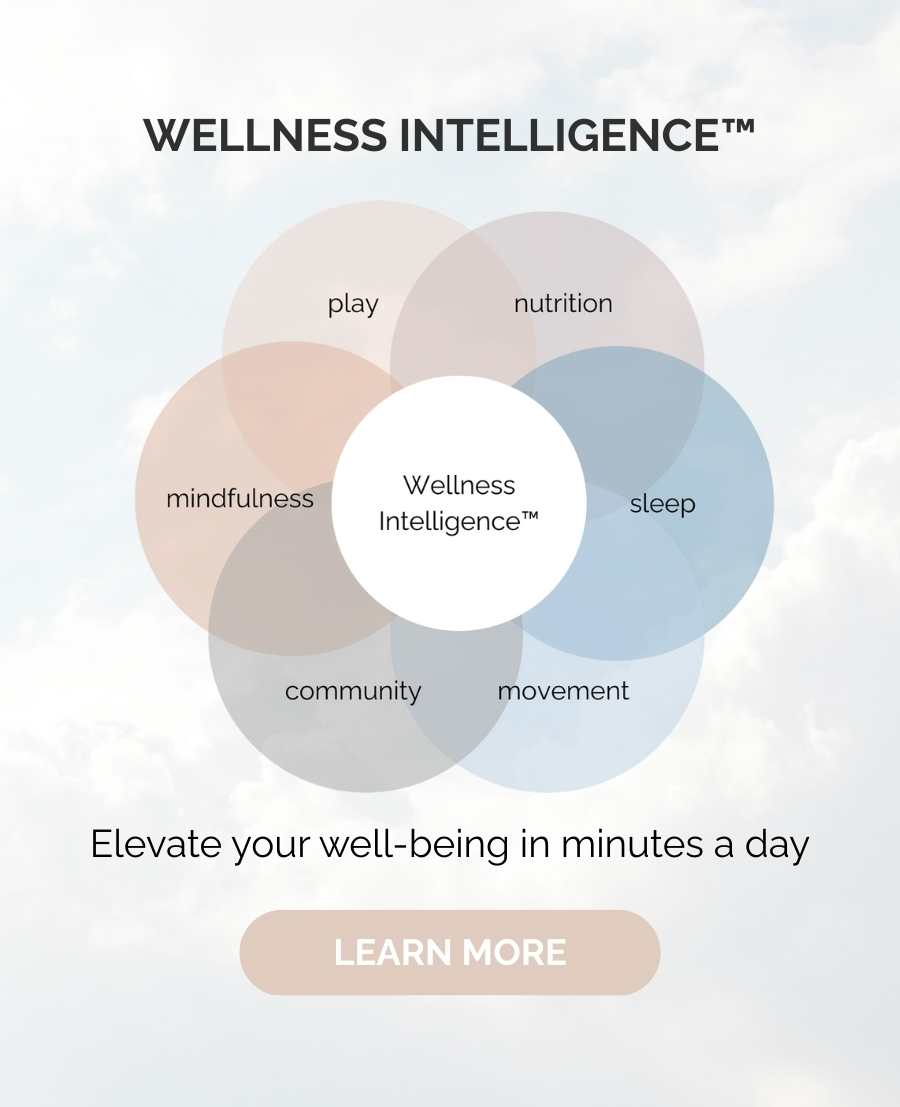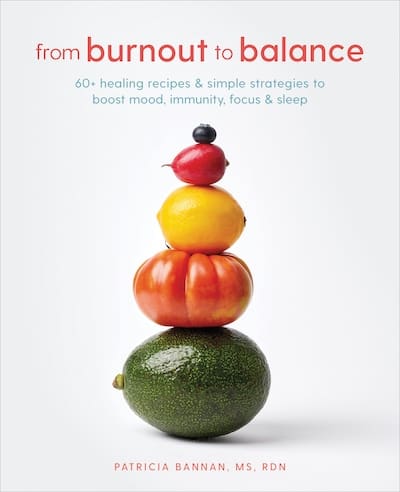I recently had the pleasure of chatting about burnout with Liz Weiss, MS, RDN for her podcast EAT, DRINK, LIVE LONGER. Liz was a former mentor of mine, so it was a pure joy to speak with her and to discuss a topic that’s so near and dear to my heart. Liz interviewed me about my book and realistic ways to overcome burnout.
The following contains key parts of our Q&A discussion from Podcast Episode 114: Recipes, Tips, & Strategies to Turn Burnout Into Balance with Patricia Bannan, MS, RDN.
1. LIZ: Patricia, tell everyone a bit about yourself!
PATRICIA: I’m a registered dietitian nutritionist, healthy cooking expert, and mom living in Los Angeles.
Like you Liz, I’ve coupled my nutrition degree with communications, which means in a way I’ve combined nutrition with journalism. I enjoy writing for magazines, doing nutrition segments on television, working with like-minded companies, and I just released a new book that I’m super passionate about.
As for my nutrition philosophy, it’s about fueling your life with foods you love, that love you back. Meaning foods that taste good when you eat them and feel good in your body after you eat them.
2. LIZ: What is burnout? Please define it.
PATRICIA: The core characteristics of burnout include:
- Feelings of energy depletion or exhaustion
- Increased mental distance from work or a cynical or negative attitude towards work
- A drop in professional performance
The World Health Organization (WHO) formally recognized occupational burnout as a “syndrome” in May 2019. And while the WHO just recently defined burnout, it was first measured more than 25 years ago on the Maslach Burnout Inventory.
While the WHO definition of burnout is solely focused on occupational burnout, as a practitioner I think it’s important we realize the holistic nature and enmeshed causes of burnout, particularly for women, with the 3 pillars being: work stress, life challenges, and personality type. For me with a Type A, perfectionist, people pleaser personality type, I’m more prone to burnout than other personality types.
It’s also important to point out that stress generally does not cause burnout when adequate support is available. Read more about the main differences between stress and burnout.
3. LIZ: Talk about your personal experience with burnout.
PATRICIA: I’ve experienced burnout firsthand and I can say it’s exhausting, alienating, numbing, and downright sucks. About 4 years ago, when my daughter was just 6 months old, I was in Sedona, Arizona on a vacation. And if you’ve ever been to Sedona with its incredible red rocks, you know it’s a pretty magical and healing place.
And during that vacation I started to unwind, and I started to realize that so many of the challenges I had faced during the past 5+ years, both personally and professionally, so many of the fears and uncertainty that caused sleepless nights, headaches, and stomach pain … well, somehow, they all worked out.
But, instead of being elated, I found myself on a massage table unable to move. I was completely depleted. It was like that feeling of exhaustion after pulling an all-nighter for an exam, but my “all-nighter” had lasted half a decade. I realized at that point I needed to get “back to basics” with my own wellness.
So, through a “back to basics” approach, which I share in the book, I learned to:
- Simplify where I could
- Prioritize my own wellbeing
- Reevaluate what was really important to me
And it worked! A few months later I started feeling like myself again. I had more energy and my creativity started to return. And while I still have moments of stress, I’ve learned tools to diffuse things before they get too big. Overall, I have more joy and balance in my life than ever before.
4. LIZ: Why did you write this book … and give us a quick overview of the book. What can we expect? Describe your “healing” recipes.
PATRICIA: After realizing I was burnt out and needed help, I started talking to other women I was close with about my experience. I was surprised that practically every woman I shared with was so eager to share their story with me … either how they felt burnout now or how they had experience burnout at some point in their life, yet they had mainly bottled it up.
So that’s when I started to research the topic, and I learned that the burnout epidemic is real, especially for women. In fact, a 2021 Gallop Poll shows that 1/3 of women currently report feeling burnt out at work, and while men also report burn out, the gender gap has widened during the pandemic.
I’d become super intrigued by the science of burnout, including how nutrition and lifestyle factors can help prevent or beat burnout. Thats why I wrote this book.
A true labor of love, it’s part health book and part cookbook — it’s like two books in one. You can learn more on my book page.
5. LIZ: What are the negative health consequences of burnout? Can it really zap us of good health? This is a podcast about living longer and better. Sounds like burnout can sabotage that goal.
PATRICIA: Regardless of gender, burnout takes a pretty hefty toll on your health. It increases your risk for:
- Heart disease
- High blood pressure
- Type 2 diabetes
- Metabolic syndrome
- Respiratory issues
- Chronic inflammation and possibly autoimmune conditions
- Alcohol or substance abuse
- Even broken relationships
ALL of which can affect you living a longer, better life!
6. LIZ: So … give us some tips for busting burnout? We don’t have time for all of them but share a few top-level tips.
PATRICIA: Two of the back-to-basics food solutions in my book are to:
- Prioritize plants. This plan is heavy on the plants, from fruits and vegetables to nuts, seeds, pulses, and whole grains. Not only do you get plenty of fiber, but you also get a host of other essential nutrients and phytochemicals to help you feel your best.
- Find your balance in the kitchen. We all have different interest levels, skill sets, and availability when it comes to cooking. If baking sourdough bread on the weekend is your way of recharging, that’s great. However, if cooking generally adds stress to your life and a midday hike is more your speed, grab a yogurt with granola and hit the trails.
7. LIZ: You list the four core symptoms of burnout in the book and you offer strategies for improving — mood, immunity, focus, and sleep. How can you boost each of them?
PATRICIA: In the book, there is a chapter on each of these four core symptoms with lifestyle strategies, top 25 food lists, meal plans, and real-life stories and guidance to help you target the area of your life you struggle with most.
Here are a few examples of strategies that can help in each of these areas:
- MOOD: Spend time outdoors. One of the best things you can do to boost your mood is spend some time in nature. A study published by the Journal of Positive Psychology showed that a micro dose of Mother Earth — just five minutes, to be specific — is all you need to feel, and be, happier and healthier.
- IMMUNITY: Stay hydrated. There’s a meme that perfectly illustrates why water is so important to good health: The human body is 90 percent water, so we’re basically just cucumbers with anxiety. Drinking water is one of the best things you can to keep your inner defense system strong.
- FOCUS: Streamline your meals. Eat the same breakfast every single day or pack the same lunch instead of stressing about what to make as you’re running out the door. It’s estimated that adults make 35,000 decisions a day. I’d wager that most women make at least half of those for other people. Over time, we start to experience decision fatigue, which can erode your energy and focus.
- SLEEP: Unplug and utilize tech for wellness. If I had to choose one single tip to improve sleep, it would be unplug thirty minutes before bedtime. The blue light emitted by screens confuses your body’s natural rhythms and disrupts your sleep. Tech can help here. There are so many apps and gadgets that help monitor the quality of your sleep and provide tools to promote a better nights sleep, such as providing sound waves that help you relax.
8. LIZ: You say a healthy mood (and a healthy gut) starts in the kitchen. Can you elaborate on that? Give us a few examples.
PATRICIA: Certain nutrients and certain foods can help you maintain (or create) a healthy gut-brain axis. Here are three of my top 25 mood-boosting foods in the book:
- Bananas – vitamin B6 to make serotonin
- Avocados – magnesium to reduce anxiety
- Strawberries – vitamin C to help stabilize mood
These feel-good foods can do all sorts of things:
- Counteract the negative effects of stress hormones
- Keep your blood sugar levels more stable (so being “hangry” can’t sabotage your day)
- Help your brain make “happy” hormones like serotonin and dopamine
- Feed your microbiome
And these plant-based foods also improve life expectancy and quality, which I know is your focus Liz!
9. LIZ: Why can burnout trash our immune system and what can we eat to support a strong and robust immune system?
PATRICIA: So, here’s my analogy about burnout and your immune system: You can have the latest computer, with the biggest hard drive. But if you don’t charge or update that computer regularly, it starts to slow down, freeze, and sometimes stops working entirely. It’s like spilling coffee on your motherboard over and over again until it finally shorts out.
If your body is spending energy to deal with stress, that keeps it from doing its routine immune tasks.
That can look like:
- A reduced ability to defend against germs and other invaders
- Elevated blood pressure and increased heart rates
- Digestive upset, which interferes with the microbiome’s immune functions
- Higher inflammation levels
- More unhealthy habits (drinking, smoking, skipping sleep) that further erode the immune system’s efficiency
- Immune cells that are so exhausted they forget what they’re supposed to do and engage in “friendly fire” against your body
While a good diet will help with the main ailments of burnout, diet alone will not fix burnout without other lifestyle changes that support balance, which is why my book is also filled with lifestyle strategies as well.
10. LIZ: I love your recipe on page 116 for Golden Carrot Spice Muffins. Can you explain how it plays into your anti-burnout plan?
PATRICIA: Yes! I love the Golden Carrot Spice Muffins. They have just the right amount of sweetness and spice and they are a gorgeous orange color, partly due to the turmeric. Carrots are top mood-boosting food – they have vitamin A for mood support, prebiotic fiber for gut health, and folate for neurotransmitters. They’re also a top food for immunity with vitamin A to regulate immune system and keep skin and mucosal linings healthy, and fiber for immune support.
11. LIZ: Focus … or lack thereof. How does burnout impact our ability to focus and our overall brain health? Any suggestions from the kitchen for feeding our brains and enhancing focus?
PATRICIA: A common side effect of burnout is mental fatigue or “brain fog.” A 2014 research review concluded that burnout impacts cognitive function, causing symptoms including:
- A lack of creativity
- Struggles with solving problems
- Memory issues
- Attention lapses
If you looked at a brain scan of a person who has lived through trauma next to the scan of someone dealing with burnout, it will look pretty similar.
I talked earlier about reducing decision fatigue … the more you can streamline the number of decisions you need to make, the better. The other part of that, which I struggle with, is learning to prioritize the decisions that really matter. The cool thing is there are many foods that can help feed our brains, improve memory and focus.
In the book I have my top 25 food list for focus, here are three:
- Blueberries – vitamin C to protect against dementia, flavonoids to improve memory and delay cognitive decline
- Olives & Olive Oil – healthy fats for brain function and memory, vitamin E to protect brain cells
- Walnuts – polyphenols to support memory, protein for a healthy brain and nervous system, and fiber for blood sugar stability
12. LIZ: Sleep! So many people struggle with it. Why is chronic sleep deprivation bad for our health? Are there certain habits or foods that we should avoid if we’re trying to improve sleep? Conversely, what can we eat to support better sleep?
PATRICIA: According to a poll by the National Sleep Foundation, 63% of Americans aren’t getting enough rest. When you are sleep-deprived, your body is at a higher risk for illness. The most serious potential problems associated with chronic sleep deprivation are high blood pressure, diabetes, heart attack, heart failure or stroke.
Other potential problems include obesity, depression, impairment in immunity and lower sex drive. Here are some lifestyle tips from the book:
- Journal if you struggle with anxious thoughts, write them down as a way to release them
- Lavender essential oil or pillow spray
- Deep-breathing exercises
- A sleep stories app to help you relax
Three foods to help with sleep from the top 25 list include:
- Tart cherries and juice – melatonin and potassium for sleep quality
- Kiwi – vitamin C for serotonin production, potassium for sleep quality
- Peanut butter – tryptophan, vit B6 and magnesium for sleep quality
In terms of foods to avoid before bed:
- Alcohol
- Caffeine
- Heavy foods (fatty, cheesy, or fried foods)
- Spicy foods
13. LIZ: What is your favorite recipe in the book?
PATRICIA: Ohh, that’s hard! I can’t choose a favorite, but the one I make the most often, especially when we’re hosting a gathering, is the Sheet-Pan Salmon, Fingerling Potatoes & Asparagus with Citrus Miso Sauce. It’s so easy to make and I love that it’s a one-dish recipe that’s a complete, balanced meal … plus it’s a celebration of veggies. I often add the sugar snap peas as well, which is the optional supercharger. While it’s super healthy and yummy without the sauce, the Citrus Miso Sauce takes it to a whole new level!
14. LIZ: Do you think the Fountain of Youth exists in some form? Can people really age backwards if they live a healthy lifestyle?
PATRICIA: As I get older, it amazes me how people the same age can look (and more importantly BE, in terms of their health status) a decade or more apart. So what you do, and what you eat, matters. I don’t think you can age backwards, but your food and lifestyle choices can slow down aging and bring more balance and joy to your life, which will improve your longevity.
Listen to the full podcast interview on Liz’sHealthyTable.com.
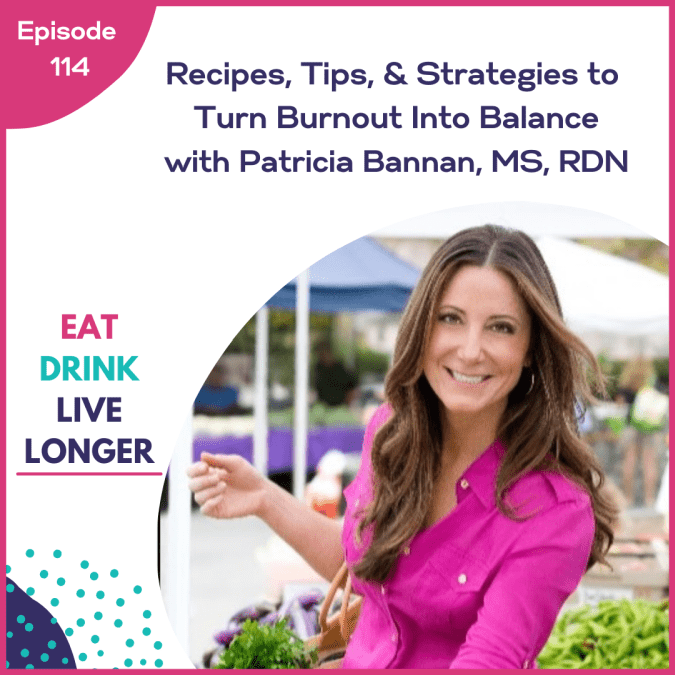
Liz also tested (and approved!) my Zucchini & Black Bean Chilaquiles Skillet recipe in From Burnout to Balance. Get the full recipe on Liz’sHealthyTable.com.
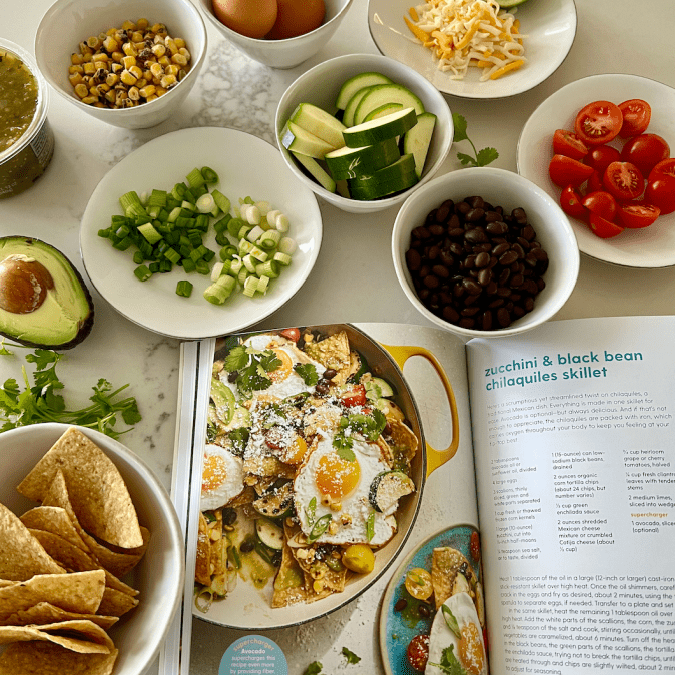
Need more help? I’ve got you covered! Check out my list of top podcasts, apps, and more for dealing with burnout.

